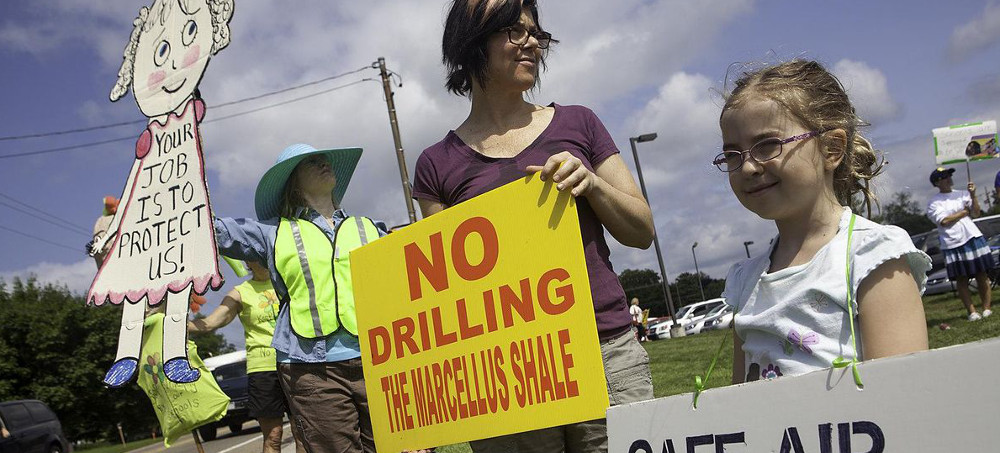
Residents protest a fracking site. (photo: AP) 27 January 22
Findings result of first major study into link between premature death and fracking
Elderly people living near or downwind from unconventional oil and gas wells such as fracking sites are more likely to die prematurely, according to a major new US study.
Extracting oil and gas through newer or unconventional methods like fracking has expanded rapidly across America over the past two decades with at least 17.6 million people now living within one kilometer of an active well.
Compared with traditional drilling, unconventional oil and gas development (UOGD) is linked to higher levels of exposure to toxic air pollution and poor water quality, as well as noise and light pollution which can be harmful to human health. The impact of fossil fuel extraction – including by unconventional methods – has disproportionately affected low income communities and people of color.
Researchers from the Harvard TH Chan School of Public Health studied the health records of 15 million people on Medicare, the health insurance program that includes at least 95% of Americans aged 65 and older, living in all significant drilling regions from 2001 to 2015. They also gathered data on about 2.5m oil and gas wells covering leading exploration states, from Montana to Texas and Pennsylvania.
The closer people live to an oil and gas operation, the higher the risk of dying prematurely, even after accounting for socioeconomic, environmental and demographic factors such as gender and race, according to the study published in Nature Energy.
Residents most adversely affected are those living nearby and downwind, suggesting toxic airborne contaminants emitted from UOGD sites probably contributed to higher mortality rates. Exposure to toxins associated with unconventional drilling such as volatile organic compounds (VOCs), nitrogen oxides and radioactive materials are linked to a wide range of life-threatening medical conditions.
“Our findings suggest the importance of considering the potential health dangers of situating UOGD near or upwind of people’s homes,” said Longxiang Li, a postdoctoral fellow in the Department of Environmental Health and the study’s lead author.
Overall, elderly residents living near these wells have about 2.5% higher mortality rates than those living far away compared with 3.5% for those who are also downwind. This would mean thousands of premature deaths linked to the oil and gas boom, though the peer-reviewed study does not include estimates of lives lost.
This is the first major study into the link between premature death in older people and unconventional oil and gas drilling activities, and the first to examine the importance of wind direction. As of 2015, more than 100,000 onshore UOGD wells have been drilled, with many clustered around densely populated residential areas.
“Although UOGD is a major industrial activity in the US, very little is known about its public health impacts. Our study is the first to link mortality to UOGD-related air pollutant exposures,” said Petros Koutrakis, professor of environmental sciences and senior author of the study.
It builds on previous studies that have found residents living near these sites are significantly more likely to suffer prenatal complications, cancers and respiratory and cardiovascular diseases.
As unconventional oil and gas exploration continues apace further research is needed to understand the causal links between living nearby or downwind and adverse health effects, the authors conclude.
Doesn't matter who you are or what you believe in. Pollution knows no politics, no religion, no skin color, no sexual orientation - just death.



No comments:
Post a Comment